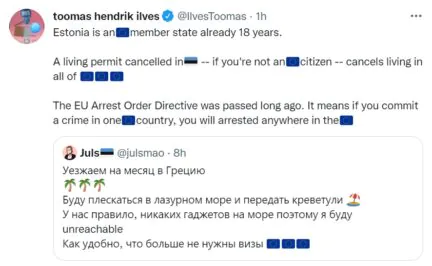© ROOT-NATION.com - Use of content is permitted with a backlink.
It’s no exaggeration to say that social networks are the key to interacting with the whole world, they provide endless opportunities for anyone. Someone uses them to communicate, study or conduct business, stars (sports, music, cinema) – to interact with fans and maintain ratings, large corporations – for the image of the company, and politicians – to ‘be closer to the people’. That is, everyone can find their own scenario of using social networks. But against the background of all the advantages of this tool, there is one ‘but’ – watch what you post. After all, the consequences of a careless tweet or post on Facebook can be extremely unpredictable.

We suggest you consider one instructive story that recently unfolded on Twitter and very tellingly illustrates the other side of social networks.
One of the most popular Miranda rules we know well from the movies is: ‘Anything you say can and will be used against you in court.’ That’s what happened (although there’s no legal action yet) with one Twitter user who decided to show off how her social and economic life is organized and how she ‘hacked reality’. The user is a native of the Russian Federation, lives in Estonia, works for the United States, and pays taxes in Georgia.

In response to a comment about why everything is so complicated (living in one place and paying taxes in another), she answered, ‘because of the tax rate.’ For example, in Estonia the tax rate is 60% of the profit, and in Georgia it can be 1%. Well, isn’t she smart?

A post in the form of ‘I don’t want my 60% of my income to be spent on some Ukrainian refugees’ only added fuel to the fire. Of course, this outraged many users, not only from Estonia or Ukraine, but also from other parts of the world. Apparently, in response to the question, what makes her different from a refugee, she answered:

Logic has already left the chat, because the immigrant woman says that she works and pays taxes, which means she is more useful for the country than refugees. But there is one problem here – she does not pay taxes in Estonia, so the statement is rather dubious.
Perhaps this whole story would have been limited to hate and condemnation in the comments, but it reached Toomas Hendrik Ilves personally. A user from Hungary contacted him with a request to deal with tax fraud.

It is worth noting that Ilves is the former president of Estonia, who ruled the country for two terms in a row: from 2006 to 2016. And, it is worth noting that he started actively using social networks back in 2012, during his presidency. Toomas Hendrik Ilves is distinguished by the fact that he supports the Ukrainians in the war against the Russian Federation, and also fully supports the pro-European development course of Ukraine.

However, it is hard to believe that the real ex-president of Estonia is commenting on you. The immigrant expressed her doubts about this in the following tweet.

Why did an immigrant from the Russian Federation become a ‘red rag’ for the ex-president of Estonia?
For Estonians, non-payment or fraud with taxes is one of the biggest social ‘sins’. Estonians compete for who pays their taxes the fastest and are very proud of it, Ilves himself writes about it. So the ex-president’s reaction to the words of the immigrant-swindler was swift and harsh. However, he commented not only on our heroine, but also told why Estonia is generally not happy with immigrants from the Russian Federation.
- Estonia itself suffered from mass deportations, occupation and russification for 50 years, so Estonians now sympathize with Ukrainians and support them a lot.
- Estonia has had more than 30 years of contentious relations with Russia, which has threatened to invade to ‘show Estonia who’s boss,’ used gas blackmail and ‘tourists’ to incite unrest.
- Estonians have no illusions that Russian immigrants will ever turn into non-imperialist democrats.
- Violation of Estonian laws, as demonstrated by the lady from the Russian Federation, is a complete disrespect for the country.
- And, finally, the hostile attitude of the Russians towards the Ukrainians in Estonia, whom the Estonians support and admire.
Now it becomes clear why the immigrant is so passionately indignant about the russophobia of the Estonian authorities.

But a similar attitude will probably apply to all Russians who are in Estonia and despise the rules of life in this country.
How did the matter end?
As a result, the tax fraudster from the Russian Federation lost her job and must be deported from Estonia in the near future.

A little later, the ‘heroine’ made a tweet in which she says about a month’s vacation in Greece. But that’s not how you run away from responsibility, as Mr. Ilves wrote. For non-EU residents, the ban on staying in one EU country automatically applies to all others. The same applies to the punishment for crimes: if the law is broken in one EU country, you can be arrested in any other European state.

Conclusions
What does this story show us? First, social media is an incredible power, not just a means of communication or a place to post cats and vacation pictures. The ‘butterfly effect’ can cause anything and this should be taken into account when diving into the boundless Internet space. After all, stupidity and courage, as the above example shows, is not the best strategy in using social networks.
Read also:
- How Ukrainians use social networks during the war
- Does Russian intelligence use social networks to find Ukrainian Armed Forces?
You can also help Ukraine fight with Russian occupants via Savelife or via an official page of the National Bank of Ukraine.






